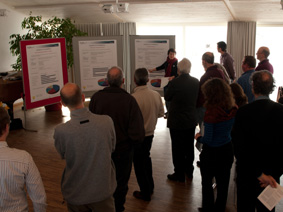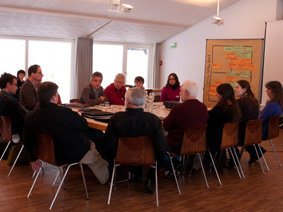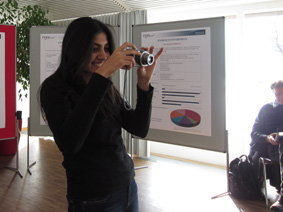CCES Winter School 2012
"Although most academic studies and PhD programs have parts on "the role of science" or something like that, a deeper thinking and understanding came only in the Winter School - I liked it, that we are all not philosophers but try to get to the core: why is science important, what is the essence of scientific work, what is its role in society. I definitely think not differently, but deeper, on the subject."
Participant 2012
PhD students from various universities
25 PhD students joined the second edition of the CCES Winter School in 2012. The participants came from various institutions: ETH Zurich, EAWAG, EMPA, Institute for Snow and Avalanche Research SLF, Swiss Federal Institute for Forest, Snow and Landscape Research WSL, but also from Université de Lausanne, Leuphana University of Lueneburg, and Helmholtz Centre for Environmental Research UFZ.
The participants covered a great variety of dissertation topics. Themes ranged from a broad spectrum in natural sciences, like water quality or biotransformation, to dissertations that were based on social sciences, like governance of forests or governance of energy.
A group of well-qualified lecturers and partners from practice advised and coached the students during two block weeks. The Winter School 2012 took place at Boldern, in Männedorf. The Winter School was organized by the Competence Center Environment and Sustainability CCES of the ETH Domain.
Working together with stakeholders
After learning about the theoretical background of the ways of how to managing knowledge interfaces and enhancing knowledge sharing, the participants implemented their knowledge their new awareness and actively worked on nearly real-life situations. The topic of the CCES Winter School 2012 was «energy». The decision of the Federal Council to phase out of nuclear energy production and open questions about the «Energiewende» energy transition make the energy topic currently relevant also for the municipality of Männedorf, the place of the seminar venue. One specific goal of Männedorf was to receive the European Energy Award and become an external page "Energiestadt", which basically represents a label indicating exemplary municipal energy policy.
"Consultation"

The task of "consultation" consisted of an exploration course. Within this course, three energy scenarios were presented to the invited stakeholders. The stakeholders were experts from both the energy and the agricultural sector.
Each of the 12 stakeholders was guided through the entire process by an interviewer, who was there helping and answering questions. After conducting one-to-one interviews, the different opinions and statements were analyzed and the results presented to the entire group.
"Collaboration"

The group "collaboration" invited various stakeholders from Männedorf and neighboring communes and facilitated a moderated exchange and discussion about the difficulties of better engaging the members of the community better in matters of energy. how to engage the members of the community better in energy questions.
For that purpose, a short introduction on the topic was given by the Winter School participants. Afterwards, the stakeholders split in two groups with the aim of ranking the challenges Männedorf is facing in view of acquiring the European Energy Award status. After this group work, the stakeholders presented their results and discussed the main issues, moderated by the Winter School participants.
"Information"

According to their interests, the students of the information group could choose between several tasks:
- create a video that showed the different phases of the Winter School,
- learn to write a media release, or
- learn to write for a website and help to redesign the website of the CCES Winter School.
These three different ways of communication taught the students how to deal with information themselves and then how to bring it across to stakeholders, other students, and people of interest.